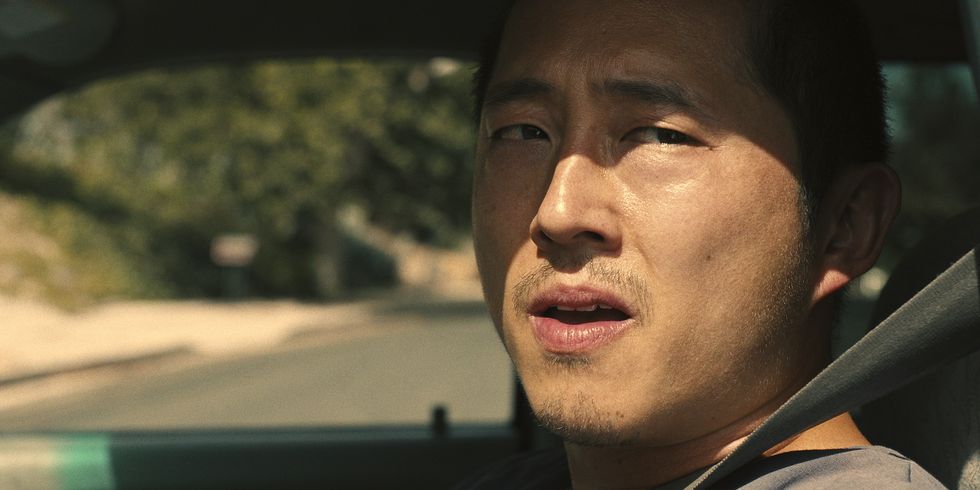The chief piece of advice I read about having a successful marriage – I’m not married, just interested in other people’s relationships – is that you must not go to bed angry. Relationship blogs and agony aunts agree: resentment builds when you fall asleep, annoyed about something your mother-in-law said or that your partner slept with a colleague. This sounds about right, though difficult to put into practice. Are you supposed to stay up until 2AM discussing intrafamily dynamics or adultery? Again, I am not married (promise!) but this sounds tiring. Even harder, and definitely less realistic, is the idea that you can just… let go of that anger. The impossibility of such guidance came to mind while watching A24 and Netflix’s new series Beef, which asks: how long can you stay mad? And another, more intriguing question: is anger so bad anyway?
Beef, which is out today, kicks off with some white-hot rage, not between a married couple, but complete strangers. Danny (played by Minari’s Steven Yeun), a down-on-his-luck construction worker, almost collides with an SUV in a car park. The woman driving the white SUV is Amy (Ali Wong), a put-together business owner and mother. The almost-accident becomes a full-on car chase through the Los Angeles suburbs: they rip through flower beds, fling middle fingers at one another and veer into oncoming traffic. Eventually, the chase ends, but their obsession has only just begun. Danny tracks Amy down, and pisses all over her bathroom. Amy finds Danny’s business online, and leaves hysterical reviews. So it goes.
This incident barrels through Danny and Amy’s lives, and all their family and friends’ lives, for the following days, weeks, months. There are high stakes for Amy, who has turned her upscale plant store into a tempting proposition for Jordan (Maria Bello), an unfathomably-rich power player. If anyone finds out about the road rage indiscretion, which was caught on camera, that deal might be jeopardised. But Danny, with his hazy ambitions and parents back home in Korea, is driven by something just as powerful: unfulfilled dreams. Their overlapping journeys spill out across ten zippy half-hour episodes; Amy uncovers a long-repressed rage and anxiety, while Danny battles the whims of his brother, Paul (Young Mazino) and his no-good cousin Isaac (David Choe).
Wong, a comedian best known for skewering specifics about millennial culture and Asian American life, is a revelation in her first role as a dramatic lead. Yeun, an Oscar-nominated actor who consistently chooses fascinating roles, is typically great. When the two are together, and the show is wise to keep them apart for long stretches, it’s electric. It is hard to pin down their relationship – not exactly enemies, no lingering feelings of romantic love, definitely not friends – and Beef is all the better for it. These rage-crossed Los Angelenos don’t know why they can’t let the incident or each other go, only they are not able to, and so they propel each other forward.
Beef cuts through almost everything else on Netflix at the moment. While watching, I occasionally thought of Orange is the New Black or Unbreakable Kimmy Schmidt, not because they are particularly similar, though they do all have a similar frenetic rage, but because it recalls a time when the streamer commissioned original series, not simply shows about a teenager at a miserable school or a teenager with superpowers or a teenager with cancer. That is likely attributable to show creator Lee Sung Jin, who developed Beef closely with A24’s head of television, Ravi Nandan. The show, in fact, was inspired by an actual rage road incident involving the writer, though he stresses that events didn’t unravel as wildly as they do on-screen. Never mind: it has a ring of truth. The compassionate, culty scenes set in the Korean American Church, in which the writer grew up, are a stand-out.
Not everything works. You could easily cut three of the show’s middle episodes, and the finale flatlines. It also feels distinctly A24, which is either a threat or a selling point, with episodes named after quotations from writers like Simone de Beauvoir and zany (read: irritating) elements like talking animals. While it is marketed as a comedy, and there are certainly humorous tones, nothing is actually laugh-out-loud funny.
But Beef is an inscrutable joy, and at a time when most Netflix shows are opaque as a brick, that’s cause for celebration. Is that soundtrack, comprising ‘00s hits from Hoobastank and Bjork, ironic or earnest (or both)? Likewise, it’s never obvious how we should feel about these characters, even as their behaviour kisses goodbye to reality. And the writing is pleasingly oblique. “Anger is just a transitory state of consciousness,” Amy tells the bored neighbourhood snoop Naomi (Ashley Park) in the second episode. Naomi loves this, and it will probably help her sleep more easily, but the entire show muddies that hypothesis. Anger goes on and on and on, wreaking both negative and positive consequences. The only thing you can say for certain is that anger is fuel. And fuel is, well, fuel.
‘Beef’ is available to stream on Netflix on 6 April
Henry Wong is a senior culture writer at Esquire, working across digital and print. He covers film, television, books, and art for the magazine, and also writes profiles.














